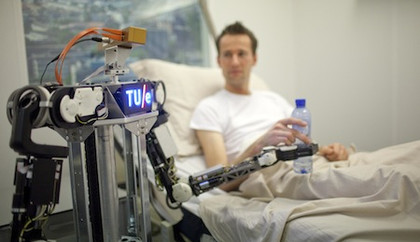The Cloud can Benefit Robots too.

The results of four years of research carried out by scientists from six European institutes (Eindhoven University of Technology (TU/e), Philips, ETH Zürich, TU München and the universities of Zaragoza and
The project called RoboEarth has been devised to demonstrate how autonomous robots could potentially learn new skills from each other by sharing information via Cloud networking.
René van de Molengraft, TU/e researcher and RoboEarth project leader explained "The problem right now is that robots are often developed specifically for one task, everyday changes that happen all the time in our environment can make all the programmed actions unusable. But RoboEarth simply lets robots learn new tasks and situations from each other. All their knowledge and experience are shared worldwide on a central, online database. As well as that, computing and 'thinking' tasks can be carried out by the system's 'cloud engine', so the robot doesn't need to have as much computing or battery power on‑board."


Discussion (0 comments)